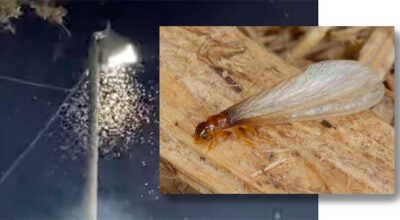Robot-wielding Mississippi students compete in tech championship
Published 6:15 am Sunday, March 12, 2023

- Teams TechnoCats (wearing green), of Bogue Chitto Attendance Center, and Slight Malfunction (in orange), from Wesson, compete in the Mississippi FIRST Tech Championships on March 4 at the Tad Smith Coliseum. Eighteen Mississippi teams competed in the competition for a chance to go to the world championships in April in Houston, Texas. Photo by Sri Chattopadhyay/Ole Miss Digital Imaging Services
Robots waged war Saturday (March 4) in the Tad Smith Coliseum as students competed in the 11th annual Mississippi FIRST Tech Challenge Championship.
Hosted by the Center for Mathematics and Science Education at the University of Mississippi, the event sees Mississippi students in grades 7-12 design and operate robots to capture and strategically place plastic cones across a 12×12-foot field. Judges, who interviewed teams on Friday before the championship, gauged how well the robots navigated a close field and how students helped one other and, at times, the opposing team.
In front of more than 250 parents, coaches, judges and support staff, two teams – Team No. 8651 Wait for It …, of Rankin Robotics in Pearl, and Team No. 6273 TechnoCats, of Bogue Chitto Attendance Center – won the day and will progress to the 2023 FIRST Championship in April in Houston, Texas.
The program has grown quickly since the first competition 11 years ago. Twenty-three teams participated in the first challenges in 2012-13, 67 in 2019-20, and 37 teams competed to qualify this year. Some teams were based at schools, such as Team Tempest from St. Patrick High School in Biloxi, while others were community teams, such as Trial and Error Robotics, from Vicksburg.
“Our mission at CMSE is to inspire students in grades K-12 to engage in STEM,” said Alice Steimle, the center’s director. “This is the perfect avenue for that. There is an entry point for every student, no matter their experience.”
Mississippi FIRST Tech Challenge not only encourages science, technology, engineering, and mathematics education, but a variety of skills including budgeting, marketing, programming, interpersonal communication and, above all, “gracious professionalism,” said Mannie Lowe, the center’s program manager.
“FIRST is the hardest fun you’ll ever have,” Lowe said. “It’s more than robotics. It gives students the opportunity to belong to a team that they may never have thought they’d be involved in. It’s a very welcoming community.”
The idea of “gracious professionalism” is embedded in all FIRST programs, Lowe said. Students from one team may lend parts or knowledge to another and, regardless of who wins or loses, each team treats the other with respect.
“The FIRST program fosters skills like communication and collaboration, which is vital in today’s world,” said Emerson Morris, high school senior and co-captain of Team Tempest. “Alongside that, it helps us find passion and community in STEM, especially women and underrepresented communities.”
Morris and Benjamin Kirby, a junior at St. Patrick’s High School and co-captain of Team Tempest, skipped what some would consider a major high school moment to attend the championship.
“We actually missed prom for this,” Kirby said. “But our instructor, she rented the conference room at our hotel last night so we could have robot prom, so that was really fun.”
Alongside building technical skills, Trial and Error Robotics team member Wesley Cowan said the program builds a sense of responsibility among its members.
“You rely on your team, and your team is counting on you,” the junior said. “There’s a lot of trust involved because if you mess up, everyone messes up.”
Cody Goss, coach of the Vicksburg-based Trial and Error Robotics, said he watches his students grow and develop skills and confidence as they participate in the program.
“I’ve actually been fortunate enough to see some of my students grow enough to get job offers,” Goss said. “That’s been one of my focuses, to grow future employees who come from Mississippi instead of us having to go out of state to get that talent. It comes from our own community.”
Beth Davis, coach of team Slight Malfunction from Wesson, said she’s watched her son, Nick, learn to solve complex problems such as trigonometry and grow public speaking and writing skills through the Mississippi FIRST program.
“Seeing that growth and the skills they learn, you know that what they’re learning now will apply to what they do for the rest of their lives,” Davis said. “I’ve watched my son grow.”





